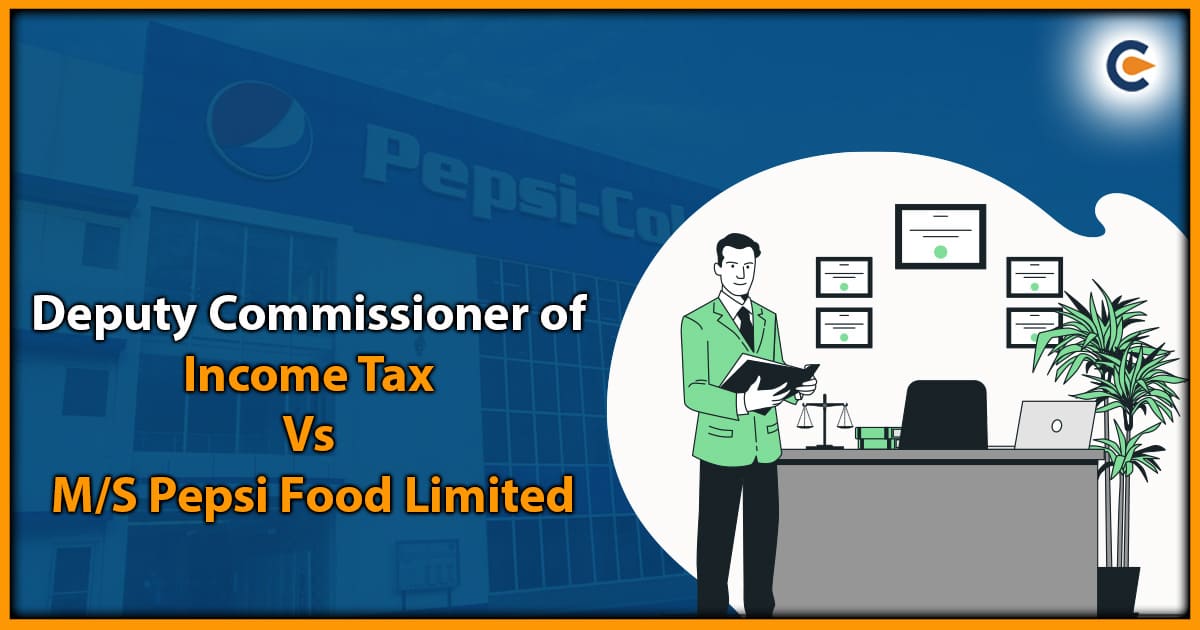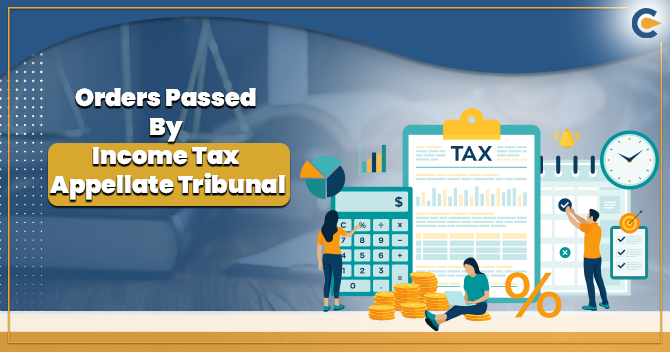In the realm of tax litigation, the case of Deputy Commissioner of Income Tax vs M/S Pepsi Foods Ltd holds significance due to its implications on the tax treatment of certain expenses incurred by companies. This blog post aims to provide an analysis of this case, exploring the key arguments, the court’s decision, and the potential impact on the taxation landscape.
Income Tax Act 1961
The Income Tax Act 1961 is a comprehensive statute in India that governs the levy, administration, collection, and assessment of income tax. It is the primary legislation that establishes the legal framework for income taxation in the country. The Act outlines the provisions, rules, and regulations related to the determination of taxable income, computation of tax liability, filing of tax returns, and various other aspects of income tax.
Key features and provisions of the Income Tax Act 1961 include:
- Scope of taxable income: The Act defines the scope of taxable income, including various heads of income such as salary, house property, business or profession, capital gains, and income from other sources.
- Tax rates and slabs: The Act prescribes the applicable tax rates and slabs for different categories of taxpayers, such as individuals, Hindu Undivided Families (HUFs), firms, companies, and others. The rates are periodically revised through Finance Acts passed by the government.
- Deductions and exemptions: The Act provides for various deductions and exemptions that can be claimed to reduce taxable income. These include deductions for specific expenses, investments, donations, and exemptions for certain types of income.
- Tax administration and assessment: The Act outlines the procedures and powers of tax authorities for the administration, assessment, and collection of income tax. It defines the roles and responsibilities of tax officers, provisions for tax audits, and the process for filing tax returns and undergoing scrutiny assessments.
- Tax avoidance and anti-avoidance measures: The Act includes provisions to prevent tax avoidance and evasion, such as general anti-avoidance rules (GAAR), transfer pricing regulations, and specific provisions to counter tax avoidance schemes.
- Advance tax and withholding tax: The Act mandates the payment of advance tax by taxpayers based on estimated income. It also includes provisions for tax deduction at source (TDS) and tax collection at source (TCS), requiring specified entities to withhold tax on certain payments made to others.
- Penalties and prosecution: The Act specifies penalties and prosecution provisions for non-compliance with tax laws, including penalties for underreporting of income, non-filing of returns, late filing, and other offences.
- The Income Tax Act 1961 is periodically amended through Finance Acts introduced in the Indian Parliament. It is accompanied by rules, circulars, notifications, and other guidelines issued by the Central Board of Direct Taxes (CBDT) to provide further clarity and interpretation of the provisions.
Background of the case
The case of Deputy Commissioner of Income Tax vs M/S Pepsi Foods Ltd originated in India and involved a dispute between the Deputy Commissioner of Income Tax and Pepsi Foods Ltd, a well-known multinational corporation operating in the food and beverage industry. The case primarily revolved around the tax treatment of certain expenses claimed by Pepsi Foods Ltd in its income tax return.
Pepsi Foods Ltd, as part of its business operations, incurred substantial expenses on advertising and marketing activities to promote its products and build brand awareness. These expenses were claimed as deductions by the company under Section 37(1) of the Income Tax Act, arguing that they were incurred wholly and exclusively for the purposes of its business.
However, the Deputy Commissioner of Income Tax took a different stance and disallowed these deductions. They contended that the expenses in question were of a capital nature, as they provided long-term benefits to the company in terms of enhancing its brand value and goodwill. According to their argument, such expenses should be treated as capital expenditures and not eligible for deduction as revenue expenses.
The dispute between Pepsi Foods Ltd and the Deputy Commissioner of Income Tax escalated, and the case eventually reached the Income Tax Appellate Tribunal (ITAT). The ITAT is a quasi-judicial body that hears appeals against the decisions of the tax authorities in India.
The case was presented before the ITAT, where both parties presented their arguments and supporting evidence. The ITAT, acting as an independent adjudicatory body, carefully analyzed the nature of the expenses and the specific circumstances of the case.
After a thorough examination, the ITAT arrived at its decision. It concluded that the advertising and marketing expenses incurred by Pepsi Foods Ltd were revenue in nature and eligible for deduction under Section 37(1) of the Income Tax Act. The court emphasized that these expenses were incurred for the purpose of promoting sales and generating revenue rather than creating enduring assets or long-term benefits.
The decision of the ITAT in favour of Pepsi Foods Ltd clarified the tax treatment of advertising and marketing expenses in India. It upheld the deductibility of such expenses as revenue expenditure, reaffirming the principle that they are incurred wholly and exclusively for the purpose of conducting business.
This case holds significance not only for Pepsi Foods Ltd but also for other businesses operating in India that incur advertising and marketing expenses. The ruling provides clarity on the tax treatment of these expenses, helping companies understand their deductibility and promoting consistency in tax assessments.
It’s worth noting that while this background information provides an overview of the case, a more detailed analysis of the arguments and the court’s decision can be found in the main body of this blog post.
Arguments presented in the case Deputy Commissioner of Income Tax vs M/S Pepsi Foods Ltd
Arguments presented in the case Deputy Commissioner of Income Tax vs M/S Pepsi Foods Ltd:
Pepsi Foods Ltd’s argument:
Pepsi Foods Ltd claimed deductions for the advertising and marketing expenses it had incurred during the relevant period. The company contended that these expenses were incurred wholly and exclusively for the purposes of its business and, therefore, qualified for deduction under Section 37(1) of the Income Tax Act.
According to Pepsi Foods Ltd, advertising and marketing activities are essential for creating and maintaining a market for their products. They argued that these expenses were directly connected to their day-to-day operations and were incurred to promote sales and generate revenue. Thus, they should be treated as revenue expenditures and eligible for deduction.
Deputy Commissioner of Income Tax’s argument:
The Deputy Commissioner of Income Tax took a different position and contested the deduction claimed by Pepsi Foods Ltd. They argued that the expenses in question were of a capital nature and should be disallowed.
The Deputy Commissioner contended that the advertising and marketing expenses provided long-term benefits to the company by enhancing its brand value and goodwill. According to their argument, these expenses should be treated as capital expenditures rather than revenue expenses. They emphasized that such expenses contributed to the creation of enduring assets and, therefore, should not be eligible for deduction.
The crux of the Deputy Commissioner’s argument was that the expenses went beyond the immediate revenue generation aspect and had a lasting impact on the company’s value, branding, and reputation.
Counter-argument by Pepsi Foods Ltd:
In response to the Deputy Commissioner’s argument, Pepsi Foods Ltd emphasized the immediate effect and purpose of the expenses. They maintained that even though the advertising and marketing activities had long-term benefits, their primary objective was to promote sales and generate revenue in the short term. Pepsi Foods Ltd argued that the immediate effect of these expenses was revenue-oriented rather than capital-oriented, making them eligible for deduction as revenue expenditures.
Pepsi Foods Ltd also emphasized the provisions of Section 37(1) of the Income Tax Act, which allow deductions for expenses incurred wholly and exclusively for business purposes. They contended that as long as the expenses met this criterion, their nature as revenue or capital expenditures should not be a determining factor.
Ultimately, these arguments formed the crux of the dispute in the case of Deputy Commissioner of Income Tax vs M/S Pepsi Foods Ltd. The court carefully evaluated these arguments and other relevant factors to arrive at its decision, which was discussed in the earlier section.
Court’s decision
The case of Deputy Commissioner of Income Tax vs M/S Pepsi Foods Ltd was heard by the Income Tax Appellate Tribunal (ITAT). After considering the arguments presented by both parties and examining the nature of the expenses in question, the ITAT arrived at its decision.
The ITAT ruled in favour of Pepsi Foods Ltd, stating that the advertising and marketing expenses claimed by the company were revenue in nature and eligible for deduction under Section 37(1) of the Income Tax Act. The court emphasized the purpose and immediate effect of the expenses, focusing on their connection to the day-to-day operations of Pepsi Foods Ltd.
The ITAT acknowledged that advertising and marketing expenses are necessary for businesses to create and maintain a market for their products. It recognized that these expenses were incurred to promote sales and generate revenue rather than to create enduring assets or long-term benefits. Therefore, the court concluded that the expenses were revenue expenditures directly related to the purpose of conducting business.
In its decision, the ITAT highlighted the provisions of Section 37(1) of the Income Tax Act, which allows deductions for expenses incurred wholly and exclusively for the purposes of business. The court found that Pepsi Foods Ltd’s advertising and marketing expenses met this criterion, as they were incurred with the primary objective of promoting sales and generating revenue.
The ruling in the case Deputy Commissioner of Income Tax vs M/S Pepsi Foods Ltd clarified the tax treatment of advertising and marketing expenses. It established that such expenses, despite providing long-term benefits to a company, should be treated as revenue expenditures and eligible for deduction. The decision emphasized the importance of considering the purpose and immediate effect of an expense when determining its tax treatment.
The Deputy Commissioner of Income Tax vs M/S Pepsi Foods Ltd case sheds light on the tax treatment of advertising and marketing expenses. The court’s decision supports the deductibility of these expenses as revenue expenditure, reaffirming the notion that they are incurred wholly and exclusively for the purpose of conducting business. This ruling provides clarity and guidance to taxpayers while emphasizing the need to evaluate the immediate effect and purpose of an expense when determining its tax treatment.
Overall, the court’s decision, in this case, provided clarity and guidance to taxpayers, reaffirming the eligibility of advertising and marketing expenses for deduction as revenue expenditures under Section 37(1) of the Income Tax Act.
Impact and Implications
The case of Deputy Commissioner of Income Tax vs M/S Pepsi Foods Ltd has a significant impact and implications for the taxation landscape, particularly concerning the treatment of advertising and marketing expenses. Here are some key impacts and implications of the case:
- Clarity on deductibility: The ruling, in this case, provides clarity to businesses regarding the tax treatment of advertising and marketing expenses. It establishes that these expenses, even if they provide long-term benefits to the company, are eligible for deduction as revenue expenditures under Section 37(1) of the Income Tax Act. This clarity helps businesses understand their tax obligations and promotes consistency in tax assessments.
- Promotion of investment in marketing activities: The decision encourages businesses to invest in advertising and marketing activities. By recognizing these expenses as deductible revenue expenditures, the ruling acknowledges the importance of promotional efforts for companies to create and maintain a market for their products. This can incentivize businesses to allocate resources towards marketing activities, which can stimulate economic growth and competition.
- Evaluation of purpose and immediate effect: The case underscores the significance of evaluating the purpose and immediate effect of an expense while determining its tax treatment. It emphasizes that expenses incurred for revenue-oriented purposes, even if they provide long-term benefits, should be considered revenue expenditures. This principle can guide tax authorities and businesses in distinguishing between revenue and capital expenditures in other contexts as well.
- Precedent for future cases: The decision, in this case, sets a precedent for future cases involving similar disputes over the deductibility of advertising and marketing expenses. Courts and tax authorities may refer to this case as a guiding precedent when determining the tax treatment of such expenses. This can bring more consistency and predictability to future tax assessments and reduce disputes related to deductibility.
- Encouragement of compliance and documentation: The ruling highlights the importance of properly documenting and justifying advertising and marketing expenses to support their deductibility. Businesses are encouraged to maintain records and evidence demonstrating that these expenses were incurred wholly and exclusively for the purposes of their business. This can lead to improved compliance with tax regulations and discourage arbitrary disallowances by tax authorities.
Conclusion
The case of Deputy Commissioner of Income Tax vs M/S Pepsi Foods Ltd has far-reaching implications for the tax treatment of advertising and marketing expenses. The decision provides clarity, promotes investment in marketing activities, emphasizes the evaluation of the purpose and immediate effect, sets a precedent for future cases, and encourages compliance and documentation. It has a positive impact on businesses operating in India and contributes to a more consistent and transparent taxation framework.
Read our Article:What Are The Different Types Of Income Tax Notices?











